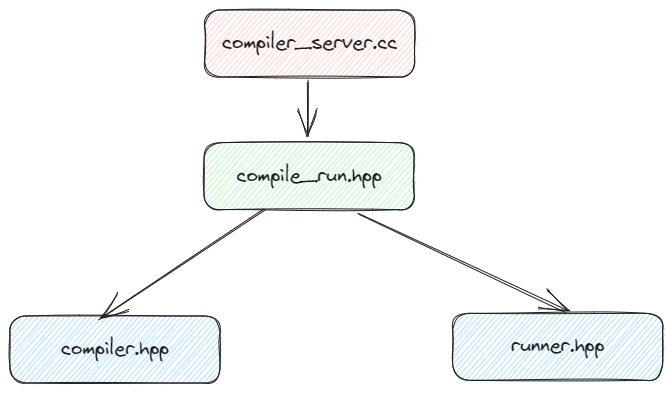该模块为编译运行功能,该模块需要使用json库,首先安装json,作用是将结构化的数据转化为字符串,做序列化和反序列化工作
命令:sudo yum install jsoncpp-devel
整体逻辑

Start函数
1
| static void Start(const std::string &in_json, std::string *out_json){}
|
Start函数参数
start函数的两个参数
in_json: {“code”: “#include …”, “input”: “”, “cpu_limit”: 1, “mem_limit”:10240}out_json: {“status”:0, “reason”:“”, “stdout”:“”, “stderr”:“”}
in_json字符串中的内容
code: 用户提交的代码input: 用户给自己提交的代码对应的输入,暂不做处理cpu_limit: 时间要求mem_limit: 空间要求
out_json字符串中的内容
status: 状态码 (必填)reason: 请求结果 (必填)stdout: 程序运行完结果 (选填)stderr: 运行完的错误结果
Start函数逻辑
- 反序列化解析
in_json字符串内容
- 根据
in_json中的内容(代码、输入、限制条件)编译运行
- 将编译运行期间的状态、结果、错误等信息序列化,通过输出型参数
out_json输出
具体细节代码
1
2
3
4
5
6
7
8
9
10
11
12
13
14
15
16
17
18
19
20
21
22
23
24
25
26
27
28
29
30
31
32
33
34
35
36
37
38
39
40
41
42
43
44
45
46
47
48
49
50
51
52
53
54
55
56
57
58
59
60
61
62
63
64
65
66
67
68
69
70
71
72
73
74
75
76
77
78
79
80
81
82
| static void Start(const std::string &in_json, std::string *out_json)
{
Json::Value in_value;
Json::Reader reader;
reader.parse(in_json, in_value);
std::string code = in_value["code"].asString();
std::string input = in_value["input"].asString();
int cpu_limit = in_value["cpu_limit"].asInt();
int mem_limit = in_value["mem_limit"].asInt();
int status_code=0;
Json::Value out_value;
int run_result = 0;
std::string file_name;
if(code.size()==0)
{
status_code = -1;
goto END;
}
file_name = FileUtil::UniqFileName();
if(!FileUtil::WriteFile(PathUtil::Src(file_name), code))
{
status_code=-2;
goto END;
}
if(!Compiler::Compile(file_name))
{
status_code=-3;
goto END;
}
run_result=Runner::Run(file_name, cpu_limit, mem_limit);
if(run_result<0)
{
status_code=-2;
}
else if(run_result>0)
{
status_code=run_result;
}
else
{
status_code=0;
}
END:
out_value["status"]=status_code;
out_value["reason"]=CodeToDesc(status_code, file_name);
if(status_code==0)
{
std::string _stdout;
FileUtil::ReadFile(PathUtil::Stdout(file_name), &_stdout, true);
out_value["stdout"]=_stdout;
std::string _stderr;
FileUtil::ReadFile(PathUtil::Stderr(file_name), &_stderr, true);
out_value["stderr"]=_stderr;
}
Json::StyledWriter writer;
*out_json=writer.write(out_value);
RemoveTempFile(file_name);
}
|
补充工具类函数
状态码解析CodeToDesc
作用:将状态码解析为对应字符串
1
2
3
4
5
6
7
8
9
10
11
12
13
14
15
16
17
18
19
20
21
22
23
24
25
26
27
28
29
30
31
32
33
| static std::string CodeToDesc(int code, const std::string& file_name)
{
std::string desc;
switch(code)
{
case 0:
desc="编译运行成功";
break;
case -1:
desc="提交的代码为空";
break;
case -2:
desc="未知错误";
break;
case -3:
FileUtil::ReadFile(PathUtil::CompilerError(file_name), &desc, true);
break;
case SIGABRT:
desc="内存超过范围";
break;
case SIGXCPU:
desc="CPU使用超时";
break;
case SIGFPE:
desc="浮点数溢出";
break;
default:
desc="未知"+std::to_string(code);
break;
}
return desc;
}
|
形成唯一文件名UniqFileName
1
2
3
4
5
6
7
8
9
10
11
12
|
static std::string UniqFileName()
{
static std::atomic_uint id(0);
id++;
std::string ms = TimeUtil::GetTimeMs();
std::string uniq_id = std::to_string(id);
return ms+"_"+uniq_id;
}
|
删除临时文件RemoveTempFile
- 判断文件是否存在
- 若存在使用unlink函数进行删除
1
2
3
4
5
6
7
8
9
10
11
12
13
14
15
16
17
18
19
20
21
22
23
24
25
26
27
| static void RemoveTempFile(const std::string &file_name)
{
std::string _src = PathUtil::Src(file_name);
if(FileUtil::IsFileExists(_src))
unlink(_src.c_str());
std::string _compiler_error=PathUtil::CompilerError(file_name);
if(FileUtil::IsFileExists(_compiler_error))
unlink(_compiler_error.c_str());
std::string _execute=PathUtil::Exe(file_name);
if(FileUtil::IsFileExists(_execute))
unlink(_execute.c_str());
std::string _stdin=PathUtil::Stdin(file_name);
if(FileUtil::IsFileExists(_stdin))
unlink(_stdin.c_str());
std::string _stdout=PathUtil::Stdout(file_name);
if(FileUtil::IsFileExists(_stdout))
unlink(_stdout.c_str());
std::string _stderr=PathUtil::Stderr(file_name);
if(FileUtil::IsFileExists(_stderr))
unlink(_stderr.c_str());
}
|











